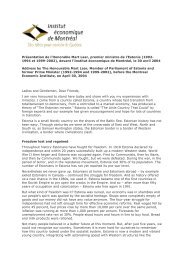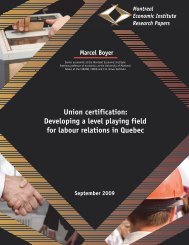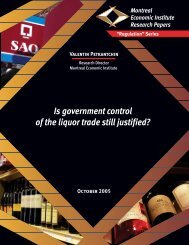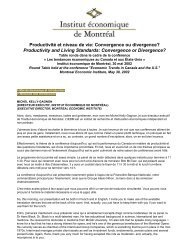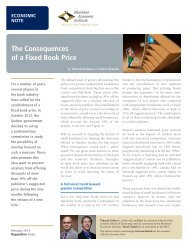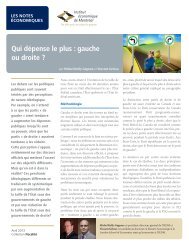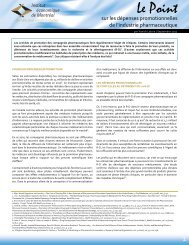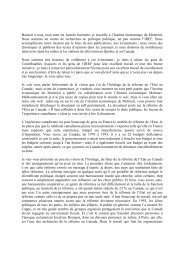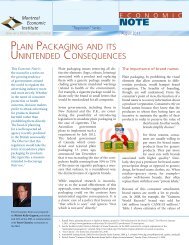Publication (PDF format) - Institut économique de Montréal
Publication (PDF format) - Institut économique de Montréal
Publication (PDF format) - Institut économique de Montréal
Create successful ePaper yourself
Turn your PDF publications into a flip-book with our unique Google optimized e-Paper software.
the bureaucrats on the donor si<strong>de</strong> earn a living bygiving money (other people’s money). Bureaucratsin donor agencies need to make donations as muchas recipient agencies need to put their hands onthem—a double moral hazard problem. 103Economist Ronald Nate argues that thefavourable treatment of bureaucrats is amplifiedin non-<strong>de</strong>mocratic countries because the rulershave more need for the bureaucracy’s support andbecause corruption is more likely to <strong>de</strong>velop. 104Note, however, that nothing corrupt or illegal needsto occur: Bureaucrats automatically spend on theirown bureaucratic goals some of the money given tothem for <strong>de</strong>velopment projects.All these bureaus, whether in donor countries,in recipient countries, or at the international level,are thus motivated to “move the money” more thanto actually further sustainable <strong>de</strong>velopment. ThePhilippines’s National Irrigation Administration,for example, gets at least 40% of its operatingbudget from capital money financed mainly byinternational <strong>de</strong>velopment loans, and the resultinglack of maintenance constantly calls for new capitalexpenditures, which are repeatedly supplied by thesame international donors. 105 The internationalagencies on the supply si<strong>de</strong> of <strong>de</strong>velopment aidalso pursue bureaucratic goals. Well-known<strong>de</strong>velopment economist William Easterly observes:U.N. agencies working on <strong>de</strong>velopmentissues do not have a stellar record; they oftenappear to spend most of their energies onlarge international summits that accomplishlittle besi<strong>de</strong>s preparing for further summits.Nor should nongovernmental organizationsbe automatically assumed to be superior toofficial aid agencies. 106It is no surprise that these bureaus, both on thegiving and on the receiving end, are after innovativeways to raise and spend money. It is no surprisethat many of these bureaus are strong proponentsof new IFD taxes.103. Araral (2009), p. 127 and passim.104. Nate (1999), pp. 160-163.105. Araral (2009).106 Easterly (2003), p. 38.Why New International Taxes for Development Are Inefficient,,The limited analysis that is availablesuggests that IFD bureaucracies aresubject to perverse incentives. ,,The limited analysis that is available suggeststhat IFD bureaucracies are subject to perverseincentives. A partial audit of the agencies thatbenefit from the French airline tax was carried outin 2010 by the auditor of the French government,the “Cour <strong>de</strong>s comptes.” 107 The Cour <strong>de</strong>s comptesaudited the two direct beneficiaries of the Frenchair ticket tax, UNITAID (which receives about 90%of the proceeds) and IFFIm (which gets the rest). 108As IFFIm is more or less controlled by GAVI, theCour <strong>de</strong>s comptes also conducted a partial audit ofGAVI.The auditors ma<strong>de</strong> many relevant observations.They noted large increases in IFFIm’s operatingcosts of 16% in 2007, 19% in 2008, and 92% in2009 as well as large remuneration costs. 109 Chart7 shows an average remuneration of €160,000 peremployee (in 2009), which reached €199,000 whentraining, representation and travel costs wereinclu<strong>de</strong>d. These costs, said the French auditor, are“cause for concern.” 110 The auditors also notedthat GAVI’s Geneva and Washington offices arerelatively “comfortable” compared to the officefacilities of government bureaucrats in donorcountries, “not to mention those of governmentbureaucrats in recipient countries.” 111 The auditormentioned that UNITAID had organized majorconferences in Geneva, Boston, Dakar, and Nairobi,but that the costs of the “very numerous meetingsand conferences” were not available. 112The reason why rent-seeking (whether fromprivate companies, business associations, tra<strong>de</strong>unions, or government bureaucrats) works is whateconomists call the logic of collective action. 113Small interest groups with concentrated benefitswin the rent-seeking game by imposing diffusecosts on larger groups. The potential beneficiaries107. Literally the “Audit Court” in English.108. Cour <strong>de</strong>s comptes (2010), p. i.109. Ibid., pp. 71-73.110. Ibid., p. 72.111. Ibid., p. 74.112. Ibid., p. 27.113. The seminal work is Olson (1965).Montreal Economic <strong>Institut</strong>e 29



